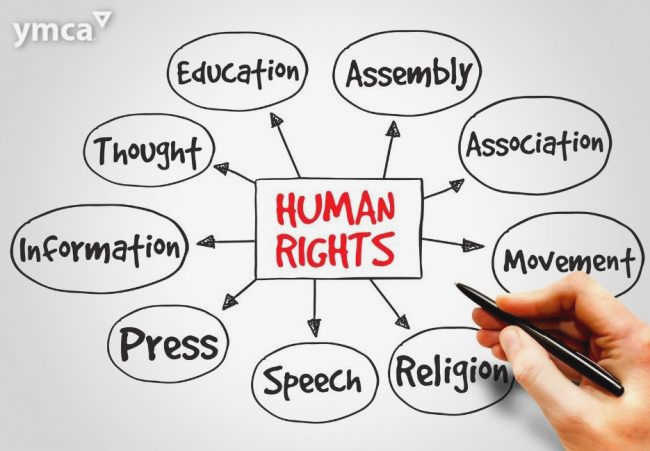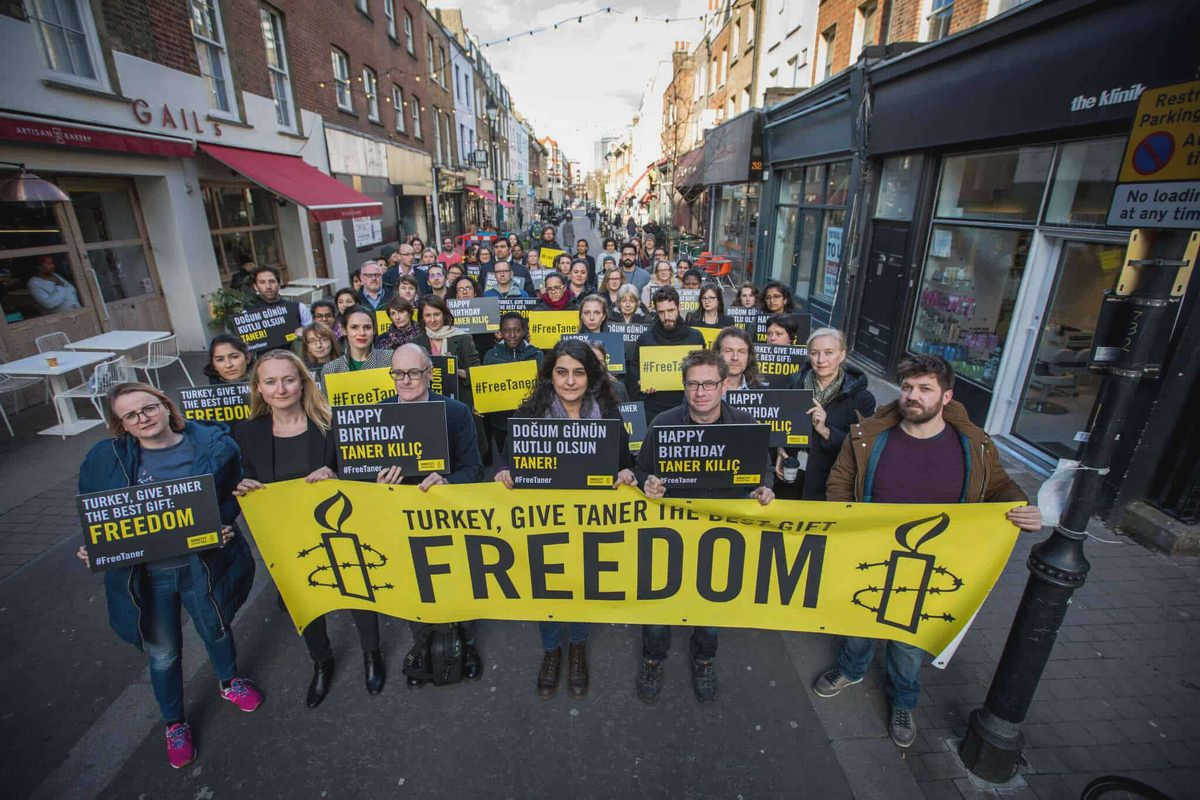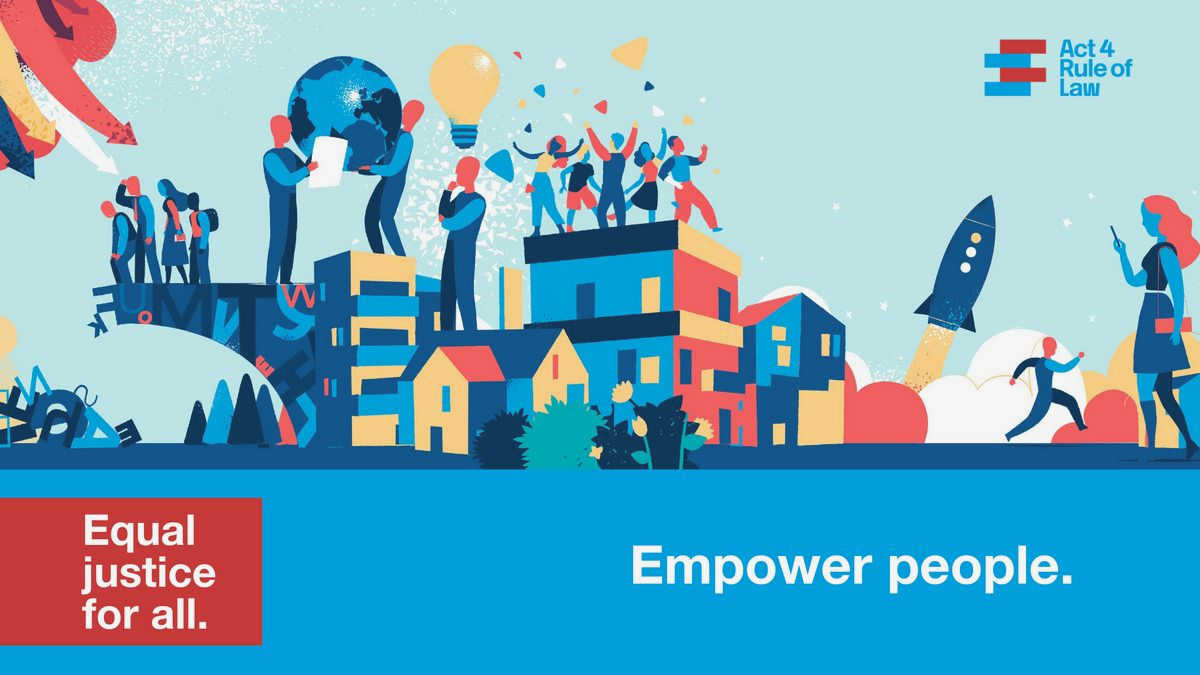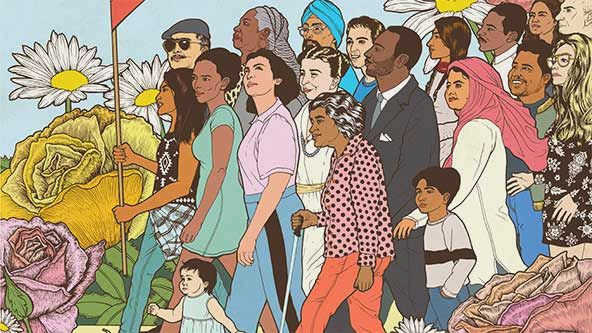Human rights play a vital role in ensuring the dignity, freedom, and equality of all individuals. Unfortunately, these rights are often violated in various parts of the world. Civil society organizations (CSOs) have emerged as powerful advocates for human rights, fighting tirelessly to promote and protect these fundamental liberties.
CSOs are non-profit, non-governmental organizations that operate independently from the state. They encompass a wide range of groups, including human rights organizations, grassroots movements, and advocacy groups. Their main objective is to address human rights violations, raise awareness, and engage in advocacy efforts to bring about positive change.
One of the key ways in which CSOs make a difference is by monitoring human rights abuses and documenting evidence of violations. They conduct extensive research, collect data, and compile reports that shed light on the extent of human rights violations in different regions. This evidence is crucial in holding governments accountable and pressing for legal reforms and policy changes.
Moreover, CSOs actively engage in public campaigns and advocacy initiatives to raise awareness about human rights issues. Through media campaigns, public events, and online platforms, they educate the public, mobilize support, and encourage individuals to take action. By amplifying the voices of the marginalized and oppressed, CSOs foster a culture of empathy and solidarity that is essential for promoting human rights.
In addition to raising awareness, CSOs provide direct assistance to victims of human rights abuses. They offer legal support, counseling services, and other forms of assistance to help victims seek justice and rebuild their lives. This support is crucial for empowering individuals to assert their rights and recover from the trauma of abuse.
CSOs also play a crucial role in advocating for policy changes at the national and international levels. They engage in lobbying efforts, participate in consultations with policymakers, and contribute to the development of human rights frameworks. Their expertise and grassroots connections make them valuable partners in shaping laws and policies that uphold human rights.
Overall, civil society organizations are instrumental in promoting human rights and holding governments accountable for their actions. Through their tireless efforts, CSOs are making a tangible difference in the lives of individuals and communities around the world, working towards a more just and equitable society.
The Importance of Human Rights
Human rights are fundamental to the well-being and dignity of every individual. They are universal, inalienable, and indivisible, meaning that they apply to all people, at all times, and cannot be taken away or divided. Human rights provide a framework for the fair and just treatment of individuals, regardless of their race, gender, religion, or any other characteristic. They ensure that everyone has the right to life, liberty, and security of person, as well as the freedom of thought, expression, and association.
Respecting and protecting human rights is crucial for building and maintaining a just and inclusive society. When human rights are upheld, individuals can live in a society free from discrimination, oppression, and violence. Human rights promote equality and social justice, as they guarantee that everyone has equal opportunities and treatment under the law. They help to create a culture of respect and tolerance, where diversity is celebrated and differences are seen as strengths.
Human rights also play a vital role in promoting peace and stability. When people’s human rights are violated, it can lead to social unrest, conflict, and even war. Protecting human rights can help to prevent and resolve conflicts, as it addresses the root causes of grievances and injustice. It fosters trust, cooperation, and dialogue between different groups, laying the foundation for peaceful coexistence and development.
Furthermore, human rights are essential for sustainable development. They enable individuals to access education, healthcare, and other basic necessities, allowing them to lead productive and fulfilling lives. Human rights empower individuals and communities to participate in decision-making processes that affect their lives, ensuring that development is inclusive, participatory, and sustainable. By promoting human rights, we can create a world where everyone can enjoy their rights and live with dignity.
In conclusion, human rights are of utmost importance as they form the basis for freedom, justice, peace, and development. Upholding and promoting human rights is not only the responsibility of governments, but also of civil society organizations and individuals. By working together, we can ensure that everyone’s human rights are respected, protected, and fulfilled, making a positive difference in the lives of people around the world.
Roles and Responsibilities of Civil Society Organizations
1. Advocacy and Awareness:
A key role of civil society organizations is to advocate for the promotion and protection of human rights. They raise awareness among the general public, policymakers, and influential stakeholders about human rights issues and work towards shaping public opinion. Through various advocacy campaigns, they engage in dialogue, lobbying, and public pressure to bring about positive changes in policies and practices.
2. Monitoring and Reporting:
Civil society organizations play a crucial role in monitoring the human rights situation at the local, national, and international levels. They conduct research, document human rights abuses, and produce comprehensive reports to hold governments and other relevant actors accountable. This monitoring and reporting function helps shed light on human rights violations, identify trends, and recommend necessary actions to address them.
3. Capacity Building and Empowerment:
Civil society organizations are often involved in capacity building activities to empower individuals, communities, and other civil society actors in promoting and protecting human rights. They provide training, workshops, and resources to enhance the skills and knowledge of human rights defenders, activists, and marginalized groups. By building the capacities of different stakeholders, civil society organizations contribute to the sustainability and effectiveness of human rights work.
4. Legal Aid and Support:
Civil society organizations offer legal aid and support to individuals and communities facing human rights violations. They provide advice, representation, and advocacy to help victims access justice and seek remedies for abuses. These organizations not only help victims navigate legal systems but also strive to reform laws and policies that perpetuate human rights abuses.
5. Collaboration and Networking:
Civil society organizations actively collaborate with other stakeholders, including international organizations, governments, and grassroots movements, to amplify their impact and create a collective voice on human rights issues. They participate in networks, coalitions, and partnerships to share knowledge, resources, and best practices. Through collaboration and networking, civil society organizations are able to address human rights challenges more effectively and influence positive change.
6. Education and Research:
Civil society organizations engage in education and research initiatives to promote human rights awareness and build a culture of respect for rights. They develop educational materials, conduct workshops, and organize awareness campaigns to educate individuals, especially young people, about their rights and responsibilities. Additionally, they conduct research and studies to generate evidence-based insights that inform policy development and advocacy efforts.
7. Empowering Marginalized Communities:
Civil society organizations play a significant role in empowering marginalized communities, such as women, LGBTQ+ individuals, indigenous peoples, and ethnic minorities. They work towards eliminating discrimination, promoting inclusion, and ensuring equal access to rights and opportunities. By amplifying the voices of marginalized groups, civil society organizations strive to address structural inequalities and promote social justice.

Advocacy for Human Rights
The Role of Civil Society Organizations
Civil society organizations play a crucial role in advocating for human rights around the world. These organizations are made up of individuals who are passionate about promoting and protecting the rights of all individuals, regardless of their background or circumstances. They work tirelessly to raise awareness, lobby for policy changes, and hold governments accountable.
Increasing Awareness
One of the primary ways civil society organizations advocate for human rights is by increasing awareness. They do this through various means, including organizing public events, engaging in social media campaigns, and producing educational materials. By raising awareness about human rights violations and promoting a culture of respect for these rights, these organizations can mobilize public support and pressure governments to take action.
Influencing Policy
Civil society organizations also play a crucial role in influencing policy and advocating for legal reforms that protect human rights. They engage in research and analysis to identify gaps and weaknesses in existing legislation and propose concrete solutions. These organizations often collaborate with other stakeholders, such as government officials, international organizations, and grassroots movements, to develop and implement effective policies.
Holding Governments Accountable
Another important aspect of advocacy for human rights is holding governments accountable for their actions. Civil society organizations act as watchdogs, monitoring human rights abuses and raising public awareness about these violations. They also document cases, collect evidence, and provide legal support to victims. Through their advocacy efforts, they put pressure on governments to investigate and address human rights violations, ensuring that perpetrators are held accountable.
Conclusion
Advocacy for human rights is a crucial component of promoting and protecting the rights of all individuals. Civil society organizations play a vital role in this advocacy work, increasing awareness, influencing policy, and holding governments accountable. Their efforts are essential in creating a world where human rights are respected and protected for all.
Empowering Marginalized Communities
Empowering marginalized communities is a crucial aspect of promoting human rights. Civil society organizations play a vital role in ensuring that the rights of marginalized communities are protected and that they have the resources and support they need to thrive.
One way civil society organizations empower marginalized communities is by providing them with access to education and skill-building programs. These programs aim to equip individuals from marginalized backgrounds with the knowledge and skills needed to overcome barriers and improve their quality of life. For example, organizations may offer vocational training courses or scholarships to help marginalized individuals gain employment opportunities and break the cycle of poverty.
Another important aspect of empowering marginalized communities is advocating for their rights and amplifying their voices. Civil society organizations work closely with marginalized communities to understand their needs and concerns. By bringing these concerns to the attention of policymakers and society at large, these organizations help to ensure that the rights of marginalized communities are respected and protected.
In addition, civil society organizations support marginalized communities by providing them with legal aid and support services. This includes offering free legal advice, representation, and mediation services to individuals who may otherwise be unable to access justice. By doing so, these organizations help to address systemic injustices and ensure that marginalized communities have equal access to legal rights and protections.

Overall, empowering marginalized communities is essential for promoting human rights and ensuring a more inclusive and equitable society. Through their work, civil society organizations play a crucial role in providing the necessary support and resources to help these communities overcome barriers and achieve their full potential.
Legal Support and Legal Reforms
Legal support and legal reforms are crucial in promoting and protecting human rights. Civil society organizations play a key role in providing legal assistance to individuals and groups facing human rights violations. These organizations offer free legal counsel, representation, and advocacy, ensuring that victims have access to justice and can hold perpetrators accountable.
Civil society organizations also work towards legal reforms to strengthen human rights protections. They analyze existing laws, identify gaps, and propose amendments to ensure that legislation aligns with international human rights standards. These organizations engage in advocacy and lobbying efforts to push for the adoption and implementation of these reforms.
Moreover, civil society organizations regularly monitor and document human rights abuses, which can serve as crucial evidence in legal proceedings. They also collaborate with legal professionals, including lawyers, judges, and prosecutors, to enhance their understanding of human rights issues and to promote justice and fairness in the legal system.
In addition to legal support and reform efforts, civil society organizations also raise awareness about human rights through public campaigns, workshops, and trainings. They educate communities about their rights and empower individuals to stand up against human rights violations.
Overall, legal support and legal reforms are essential in the promotion and protection of human rights. By providing assistance to victims, advocating for legal reforms, and educating communities, civil society organizations are making a significant difference in advancing human rights for all.
Monitoring and Reporting Human Rights Violations
Monitoring and reporting human rights violations is an essential task for civil society organizations (CSOs) in promoting and protecting human rights. By closely monitoring the situation on the ground and documenting any violations, CSOs play a crucial role in exposing abuses and holding perpetrators accountable.
Monitoring: CSOs employ various methods to monitor human rights violations, including conducting interviews with victims and witnesses, collecting and analyzing data, and conducting field visits to gather evidence. They monitor a wide range of human rights issues, such as freedom of expression, the right to a fair trial, and the protection of vulnerable groups.

Reporting: Once violations have been identified and documented, CSOs report them to relevant authorities, such as government institutions, international bodies, and the media. They often collaborate with other organizations and networks to amplify their voices and increase the impact of their reports.
Advocacy: In addition to monitoring and reporting, CSOs also engage in advocacy efforts to raise awareness and push for policy changes. They work to mobilize public opinion, lobby decision-makers, and advocate for the implementation of international human rights standards.
Impact: The monitoring and reporting of human rights violations by CSOs often leads to concrete outcomes, including legal action against perpetrators, policy reforms, and changes in public opinion. By shedding light on violations, CSOs contribute to the overall accountability and improvement of human rights conditions.

Overall, monitoring and reporting human rights violations is a crucial component of the work of CSOs in promoting and protecting human rights. Their efforts are essential for holding perpetrators accountable, advocating for policy changes, and ultimately creating a more just and equal society.
International Collaboration and Networking
International collaboration and networking play a crucial role in promoting human rights and achieving meaningful change. Civil society organizations from different countries come together to share knowledge, resources, and strategies, strengthening their collective efforts to protect and promote human rights.
Knowledge exchange: International collaboration allows civil society organizations to learn from one another’s experiences and expertise. Through networking events, conferences, and workshops, organizations have the opportunity to share best practices, discuss challenges, and brainstorm innovative solutions. This knowledge exchange fosters a greater understanding of human rights issues on a global scale and helps organizations develop more effective strategies for advocacy and activism.
Resource sharing: Collaboration among civil society organizations from different countries allows for the sharing of resources, both financial and non-financial. By pooling their resources, organizations can access funding, technical expertise, and other necessary tools to support their work. Financial resources can be used to fund critical projects and initiatives, while non-financial resources, such as research data and legal expertise, can enhance the quality and impact of advocacy efforts.
Strategic partnerships: International collaboration also facilitates the formation of strategic partnerships between civil society organizations and other stakeholders, including governments, international organizations, and businesses. These partnerships provide opportunities for joint advocacy and lobbying, as well as the development and implementation of policies and programs that promote human rights at the national and international levels. By working together, civil society organizations can amplify their voices, increase their impact, and hold duty-bearers accountable for their actions.
Amplifying the impact: Collaboration and networking allow civil society organizations to amplify their impact by reaching a larger audience and gaining broader support for their cause. By forming alliances and coalitions, organizations can coordinate their efforts, leverage their respective strengths, and mobilize a wider range of actors to advocate for human rights. This increased visibility and collective action increase the pressure on duty-bearers to address human rights violations and work towards lasting change.
In conclusion, international collaboration and networking are essential elements in promoting human rights. By sharing knowledge, resources, and strategies, civil society organizations are able to strengthen their efforts, amplify their impact, and hold duty-bearers accountable. By working together, organizations can create a global movement for human rights, driving positive change and ensuring the protection and promotion of human rights for all.
Impact of Civil Society Organizations
Civil society organizations play a crucial role in promoting and protecting human rights around the world. They serve as the voice of the people, defending their rights and advocating for social justice. These organizations have a significant impact on advancing human rights, as they work tirelessly to raise awareness, challenge repressive policies, and provide support to marginalized communities.
Raising Awareness: Civil society organizations are instrumental in raising awareness about human rights issues. Through educational initiatives, campaigns, and public events, they help to inform the public about the various rights and freedoms that individuals are entitled to. By shedding light on human rights abuses, these organizations encourage public debate and mobilize individuals to take action.
Challenging Repressive Policies: Civil society organizations often play a critical role in challenging repressive policies and advocating for legal and institutional reforms. They use various strategies, such as lobbying, litigation, and public protests, to pressure governments and other influential actors to address human rights violations. By providing a platform for affected individuals and communities to share their stories, these organizations give a voice to those who are often silenced.
Supporting Marginalized Communities: Civil society organizations provide essential support to marginalized communities, including vulnerable groups such as women, children, ethnic minorities, and the LGBT+ community. They offer legal advice, healthcare services, and psychosocial support to survivors of human rights abuses. By empowering these communities, civil society organizations contribute to the protection and promotion of their rights.
International Advocacy: Civil society organizations also play a crucial role in international advocacy for human rights. They collaborate with other organizations and participate in international forums, such as the United Nations, to advocate for global human rights standards. By sharing their expertise and experiences, they influence decision-making processes and hold governments accountable for their human rights obligations.
In conclusion, civil society organizations have a profound impact on promoting and protecting human rights. Through their efforts in raising awareness, challenging repressive policies, supporting marginalized communities, and engaging in international advocacy, these organizations help to create a more just and inclusive society.
Steps to Support Civil Society Organizations
1. Funding and Resources
In order to support civil society organizations (CSOs), providing them with adequate funding and resources is essential. This can be done through governmental grants, international donor organizations, or private philanthropy. Funding can help CSOs to develop and sustain their programs and initiatives, as well as cover operational costs such as office space, staff salaries, and capacity building activities.
2. Capacity Building and Training
It is important to provide CSOs with capacity building and training opportunities to enhance their skills and knowledge. This can include workshops, seminars, and mentoring programs on various topics such as advocacy, project management, fundraising, and human rights law. By strengthening the capacity of CSOs, they will be better equipped to promote and protect human rights effectively.

3. Networking and Collaboration
Facilitating networking and collaboration among different CSOs is another crucial step to support their work. This can be done through organizing conferences, forums, and networking events where CSOs can share their experiences, exchange best practices, and establish partnerships. Collaboration among CSOs can enhance their collective impact and amplify their voices when advocating for human rights.
4. Advocacy and Awareness Campaigns
Supporting CSOs in their efforts to conduct advocacy and awareness campaigns can significantly contribute to the promotion of human rights. This can involve providing resources for research and data collection, assisting in the development of campaign strategies, and partnering to amplify the reach of the campaigns. By raising awareness and advocating for human rights, CSOs can create positive change and influence policies and practices.
5. Government Engagement and Policy Dialogue
Engaging with the government and participating in policy dialogues is crucial for CSOs to have an impact on human rights issues. Support can be provided by facilitating meetings between CSOs and government officials, providing legal expertise and consultation on policy matters, and advocating for the inclusion of CSO perspectives in decision-making processes. This step can help bridge the gap between civil society and the government, fostering dialogue and collaboration.
6. Monitoring and Evaluation
Establishing mechanisms for monitoring and evaluating the work of CSOs is important to ensure accountability and effectiveness. Support can be provided by assisting CSOs in developing monitoring and evaluation frameworks, providing training on data collection and analysis, and conducting independent evaluations of their programs. Regular monitoring and evaluation can help CSOs identify areas for improvement and demonstrate their impact in promoting human rights.
In conclusion, supporting civil society organizations is crucial for the promotion and protection of human rights. By providing adequate funding and resources, building their capacity, fostering networking and collaboration, facilitating advocacy and awareness campaigns, engaging with the government, and implementing monitoring and evaluation mechanisms, the impact of CSOs can be strengthened, leading to positive change in society.





